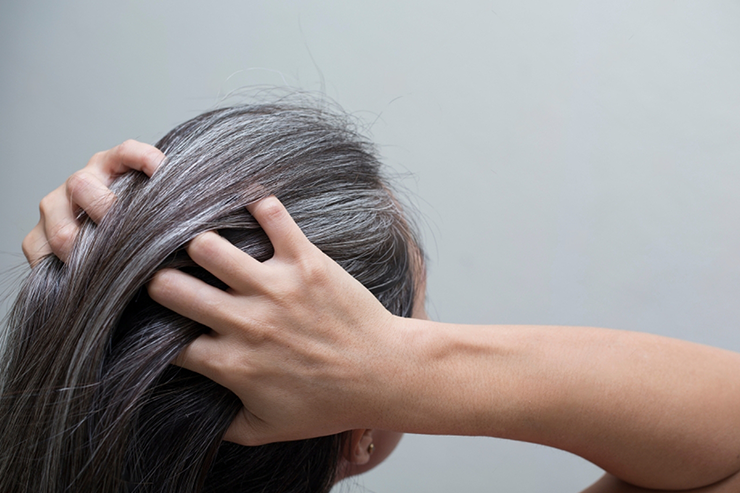8 Superfoods and Lifestyle Changes for Healthy and Stronger Hair
- ashikkhatri
- Oct 16, 2023
- 4 min read
Updated: Jan 22, 2025

Welcome to the world of healthy hair, where you can have gorgeous, vibrant locks for yourself, provided you maintain the proper dietary and lifestyle habits. In this article, we’ll take you through the impact of nutrition and daily habits on hair health. Simultaneously, we’ll also talk about 5 superfoods and lifestyle changes that one should include in their daily life.
Impact of food and lifestyle on hair
Food plays a significant role in how well your hair grows and so is the case with the lifestyle you live. Following a healthy diet helps keep your hair looking strong and shiny minus the hair fall. On the contrary, if you don’t give your body the nutrients it can have an impact on not just your overall well-being but also on how strong and healthy your hair grows. Similarly, our busy and unhealthy lifestyle has taken a toll on our hair health, so it’s time we break the chain and do what’s right.
Essential Vitamins and Minerals for Hair Growth
Biotin
Vitamin E
Omega-3 Fatty Acids
Vitamin D
Vitamin A
Iron
Protein
5 Best Foods for Stronger, Healthier Hair
Eggs

Our hair is made up of a protein called ‘keratin’, a protein deficiency could cause massive hair loss. Two of the most important nutrients for hair growth are biotin and protein and you’ll be amazed to know that something as basic as an egg has them both. Now, you can imagine what a major difference would it make if you added at least one egg to your meals. And since both protein and biotin are equally important for your hair health, a deficiency in either of the two could lead to hair loss.
Nuts

Nuts are a great snacking item. When you crave something sweet yet healthy, munch on a few nuts and you may add a few raisins for that extra sweetness. Nuts not only help curb hunger but they’re also very beneficial for the body. They’re packed with Vitamin E - an essential nutrient for better hair growth. And as per studies people who lack Vitamin E tend to face hair fall problems.
Berries

Berries are a rich source of vitamins, especially Vitamin C which is known for its antioxidant properties. And, antioxidants help protect the hair follicles against free radical damage. Free radicals are nothing but harmful molecules that are present naturally both, in our body and the environment. Simultaneously, our body uses Vitamin C to produce collagen - a protein that helps strengthen the skin and hair. It makes hair stronger and prevents it from breaking. Last but not least it helps the body absorb iron from our meals, a deficiency that leads to anemia, a condition that could be linked to hair loss.
Spinach

Spinach is a nutritious green leafy vegetable that’s loaded with beneficial nutrients such as iron, folate, vitamins A and C all of which are extremely important for your hair growth. Iron when consumed in the right quantity helps the red blood cells in our blood to carry oxygen throughout the body which in return boots your metabolism and aids in growing and repairing your hair follicles.
Fatty Fish

Fatty fish such as salmon, anchovies, mackerel, sardines, tuna, etc. are a rich source of Omega-3 fatty acids that are known to promote overall health. Additionally, they’ve also been linked with the possibility of hair growth, which is why it is important to add this essential nutrient to your daily diet. Those of you who are pure vegetarians and don’t consume fish in its original state can take supplements containing Omega-3 instead.
Lifestyle Changes for Stronger Hair
Stress Management: Stress is one of the many contributors to hair loss, however, it can be controlled. You can effectively reduce stress levels and support better hair by incorporating stress-reduction practices into your routine, such as yoga, meditation, deep breathing exercises, or regular physical activity.
Adequate Sleep: Sleep is very important for overall wellness, which includes healthy hair. The body goes through several kinds of repair and growth activities while you’re in deep sleep, including hair growth. To promote healthy hair growth and prevent challenges like hair thinning or breakage, ensure that you get approximately 7-8 hours of restful sleep each night.
Hydration: Maintaining the health of your hair and scalp requires proper hydration. When you're adequately hydrated, your bloodstream supplies a suitable amount of nutrients to your hair follicles, encouraging hair growth and preventing dryness. Drinking plenty of water keeps your scalp from becoming dry or itchy, lowering your risk of developing dandruff and other scalp problems.
Bottom Line
In conclusion, the state of your hair is directly influenced by what you eat and the way you live. Strong, healthy hair can be promoted by a balanced diet high in protein, vitamins (including biotin and vitamin E), and omega-3 fatty acids. Additionally, managing stress, getting adequate sleep, and being hydrated are essential habits that support good hair maintenance and guard against problems like dryness or hair loss. The general health of your hair can be greatly enhanced by incorporating these techniques into your regular regimen.


